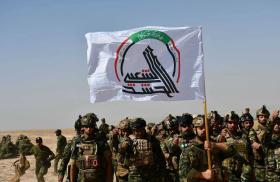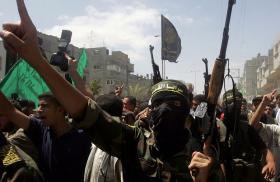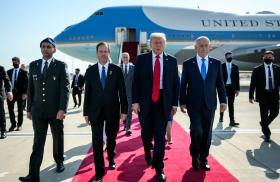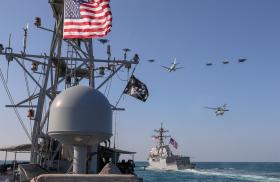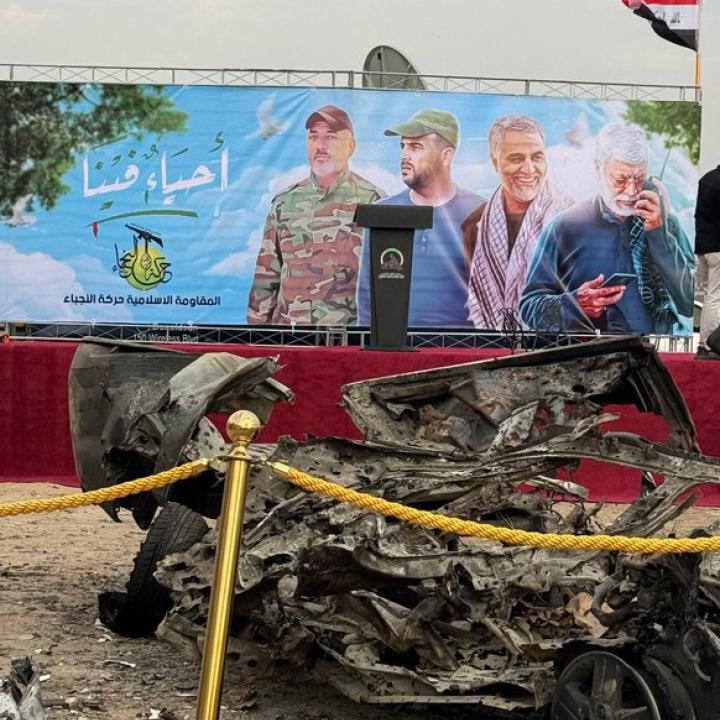
Badr and Asaib Crack the Whip on Kataib al-Imam Ali in Basra

The group stepped on Badr's toes during a recent commemoration ceremony, giving a window into the local balance of power between Iran-backed militias.
On January 5, clashes erupted in Basra at a ceremony marking the fourth anniversary of the death of Iranian general Qasem Soleimani and Iraqi militia chief Abu Mahdi al-Muhandis. A group of Kataib al-Imam Ali (KIA) fighters led by Alaa al-Mohammadawi, commander of the Popular Mobilization Forces (PMF) 40th Brigade, clashed with members of the PMF Central Security Directorate responsible for managing the ceremony. Video showed a heavy firefight breaking out and people fleeing the scene.
The PMF Central Security Directorate in Basra is headed by Jaber Sayyed Dagher al-Musawi, a senior official in the Badr Organization who also commands the PMF's 7th Brigade (Liwa al-Muntadher) and the PMF Marine/Naval Forces. Another Badr figure, Abu Mahmoud al-Badran, controls the PMF's Basra provincial office. After the incident, this office released a provocative audio message on social media: “Alaa al-Mohammadawi and his group do not represent the PMF and they have no connection to it. The PMF Security Department prepared [event] security to ensure the safety of the ceremony. Alaa’s group came with their weapons and attempted to enter and destabilize the order. PMF security faced them, and that was that. They were arrested, and now there are legal procedures against them’’ (Figure 1).
Another PMF statement from Basra added: “An undisciplined force that is not part of the PMF started sedition among the crowd that resulted in live shooting. Those individuals were arrested, and they followed someone named Alaa al-Mohammadawi. All the legal procedures will be taken, and we assure you that we won’t allow any group to destabilize the situation and drag the PMF toward sedition inside Basra province” (Figure 2).
The incident shined a spotlight on the Badr Organization's security grip in Basra. Musawi, the local directorate's leader, is the son of the late Sayyed Dagher al-Musawi, the previous commander of the 7th Brigade who died in a car crash in Basra in 2019 (Figure 3). His brother Ahmed is also a well-known player in Basra's political and security affairs.
Badr appears to have been strongly backed in this incident by Asaib Ahl al-Haq (AAH), its most powerful partner at both the national level (via the Coordination Framework) and the local level (via business activities and corruption in Basra). AAH has long recruited heavily from Basra’s large Shia population—the second largest outside Baghdad—to build its Syrian expeditionary forces (in 2011-13) and later the 41st, 42nd, and 43rd PMF Brigades. AAH social media adopted a solidly anti-KIA stance after the clashes and even issued threatening messages toward KIA founder Shibl al-Zaydi, a U.S.-designated terrorist financier who is closely tied to Lebanese Hezbollah.
As a brash local militia leader whose large motorcade regularly jams up Basra's streets, Mohammadawi did not accept the criticism meekly. In a statement carried by Shafaq News, he declared: “We regret to hear statements about us that stripped us of our jihad history in defending our country, religion, and sect, and from belonging to the holy PMF. We are the jihad, we are the PMF, and we are the men of the battles. We won't respond to whatever came out against us from our own people to protect the reputation of the PMF, but we won’t accept being stripped of belonging to the PMF either’’ (Figure 4).
In general, KIA remains a powerful player in militia commerce due to its Lebanese Hezbollah connections. Yet the group is often on bad terms with other muqawama (resistance) factions, partly because of its ability to outmaneuver these factions in business deals, but also due to its flaccid involvement in kinetic "resistance" operations. Badr has previously tried to discipline so-called "rogue militias" in other areas that it considers its satraps, like Diyala province. The Basra incident shows that the local PMF Central Security Directorate is under Badr's control, even though the PMF as a whole remains under the national leadership of Kataib Hezbollah and Abu Zainab al-Lami (Hussein Falah al-Lami), who was designated by the United States in 2019 pursuant to Executive Order 13818 for his involvement in serious human rights abuse in Iraq.



